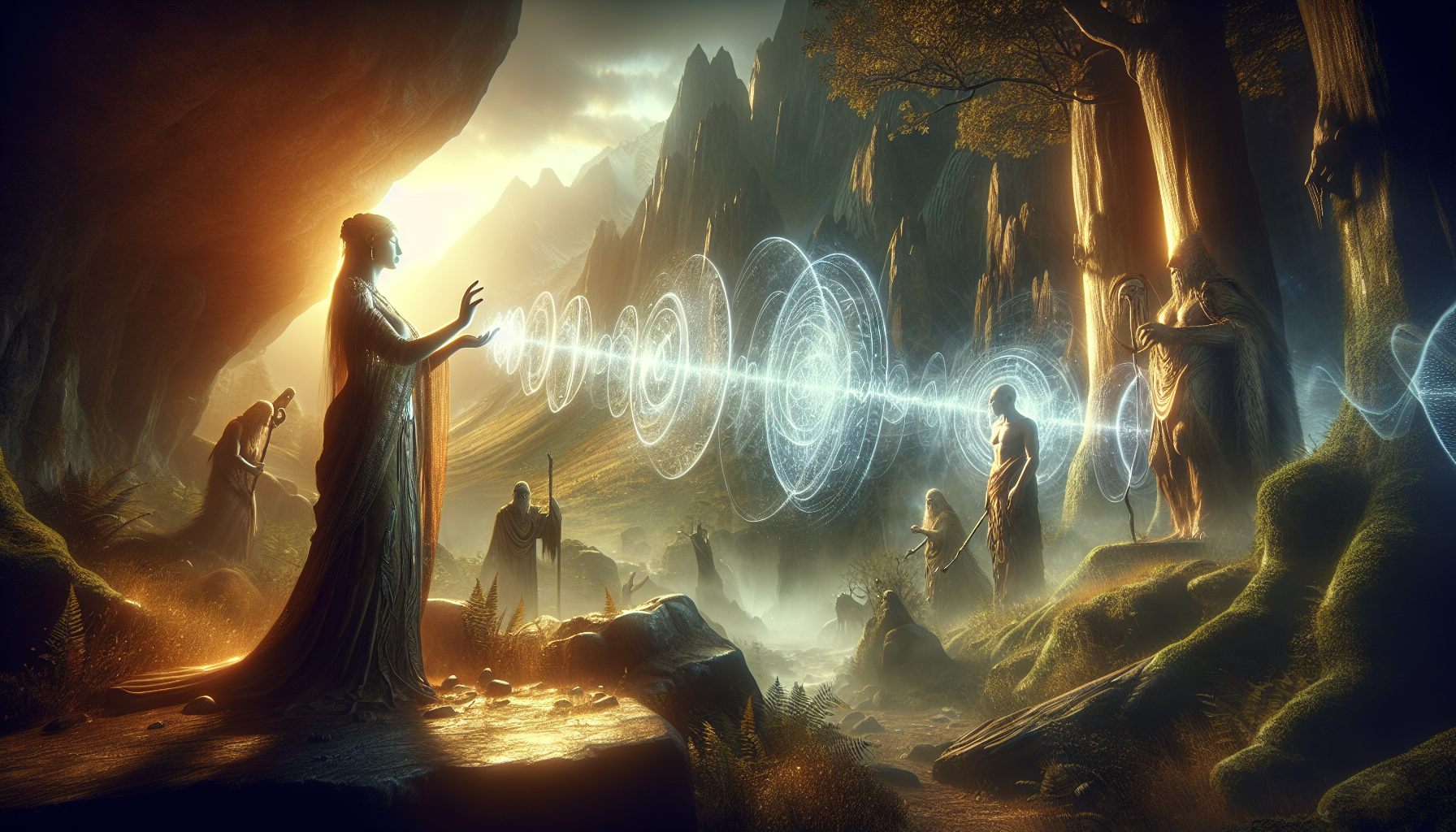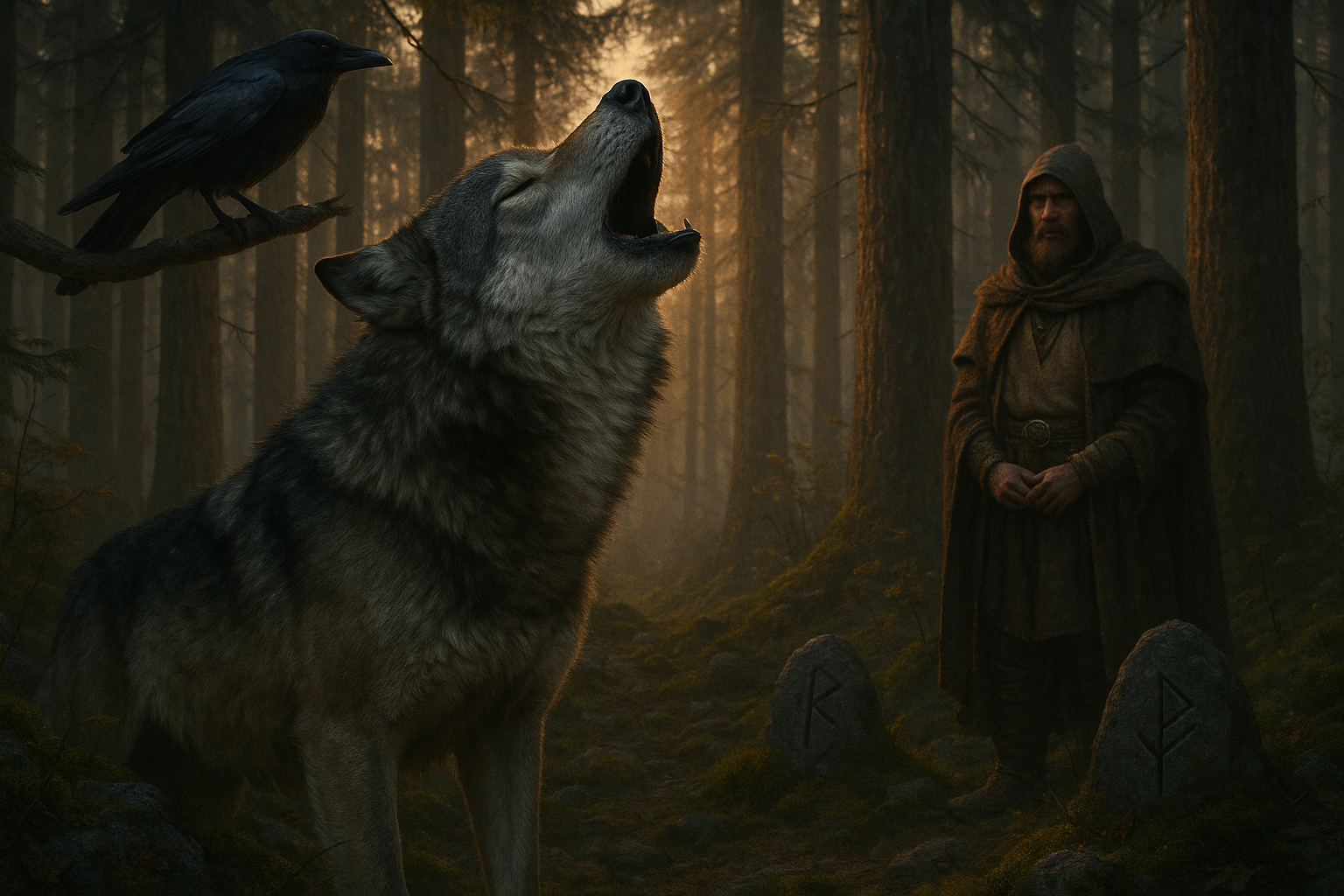In the realm of ancient mythology, where gods and mortals intertwine, few themes capture the imagination as profoundly as the concepts of voice and echo. These elements, seemingly simple in their essence, reverberate through countless myths, serving as powerful symbols and storytellers in their own right. From the resounding chants of deities on Mount Olympus to the whispered secrets of oracles in Delphi, the power of voice has been a force of transformation and revelation. Echo, its ethereal counterpart, weaves a tapestry of repetition and reflection, echoing not only sounds but emotions and destinies across the ages. 🌌
The allure of voice and echo in mythology lies not only in their auditory nature but also in their ability to transcend the boundaries of human experience. Voices in myths are not mere sounds; they are agents of change, vessels of truth, and sometimes, harbingers of doom. In stories like that of Orpheus, whose voice could charm even the stones, we witness the transcendental power of music and words to bridge the gap between life and death. Meanwhile, the tale of Narcissus and Echo reminds us of the haunting beauty and tragic consequences of unrequited love and unattainable desires. These stories, and many others like them, invite us to listen closely to the past, where every whisper and shout carries meaning far beyond the audible.
In this exploration of the mythical connection between voice and echo, we will embark on a journey through time and culture, unraveling the narratives that have captivated humanity for centuries. We will delve into Greek and Roman myths, where gods wielded their voices as instruments of creation and destruction, and mortals found themselves at the mercy of divine utterances. We will also venture into other cultures, examining how ancient Egyptians, Norse, and indigenous tribes across the world have interpreted the phenomena of voice and echo in their rich tapestry of folklore and legend. 🗺️
As we navigate these tales, we will uncover the deeper meanings and universal truths that lie beneath their surface. What do these stories reveal about human nature and our understanding of the world? How do they reflect the fears, hopes, and aspirations of ancient societies? By the end of this article, you will not only gain a deeper appreciation for these timeless narratives but also discover how the themes of voice and echo continue to resonate in our modern lives. Whether it is the echo of history that shapes our present or the voice of innovation that calls us to the future, the mythical interplay of voice and echo offers a profound lens through which to view our own stories and the world around us. 🌍✨
The Origins of Voice and Echo in Mythology
Mythology has long been a wellspring of stories that seek to explain the unexplainable, including the mysterious phenomena of voice and echo. These tales are not only captivating but also serve as a reflection of the human desire to understand the world around us. Ancient cultures often personified natural elements, and the concepts of voice and echo were no exception. They were frequently portrayed as divine or supernatural forces, woven into narratives that revealed the values and beliefs of the people who created them.
The ancient Greeks were particularly adept at crafting myths that explored the mysteries of sound. One of the most well-known stories is that of Echo, a nymph who fell in love with Narcissus. This myth is not just a story of unrequited love but also serves as an allegory for the way voices and echoes interact in the natural world. Echo’s inability to speak her own words and her perpetual repetition of the words of others serve as a poignant metaphor for the nature of echoes themselves.
Similarly, other cultures have their own unique interpretations of voice and echo. The Norse myths, for example, speak of the echoes of the gods as a way of preserving their wisdom and presence in the world. In Native American folklore, echoes are often seen as the spirits of ancestors communicating from the beyond. These varied interpretations highlight the universal fascination with the phenomena of voice and echo, and the desire to attribute meaning to them.
The Science Behind Voice and Echo
While mythology provides imaginative explanations for voice and echo, science offers a more empirical understanding. The study of sound involves the exploration of vibrations and waves, and how they travel through different mediums. Voice, in its simplest form, is the sound produced by humans when air is expelled from the lungs, causing the vocal cords to vibrate. These vibrations create sound waves that travel through the air to the listener’s ear.
Echo, on the other hand, is the result of these sound waves being reflected off a surface and returning to the original source. This phenomenon is not only fascinating but also serves practical purposes in various fields such as engineering and medicine. Understanding the science of echo can help improve architectural acoustics, design better audio equipment, and even assist in medical imaging techniques like ultrasound.
To further illustrate the science behind these phenomena, consider the table below which compares key aspects of voice and echo:
| Aspect | Voice | Echo |
|---|---|---|
| Origin | Vocal cords | Reflection of sound waves |
| Medium | Air | Various surfaces |
| Duration | Continuous | Momentary |
| Purpose | Communication | Feedback |
Understanding these differences can enrich our appreciation of the role voice and echo play not only in mythology but also in our daily lives. For a deeper dive into the scientific aspects of echoes, watch this informative video: The Science of Echo – National Geographic.
Cultural Interpretations and Symbolism
Beyond the realms of mythology and science, voice and echo have found their way into various cultural narratives as symbols of communication, memory, and identity. In literature, echoes often symbolize the persistence of memory or the haunting presence of past actions. They can represent the idea that actions and words have lasting impacts, much like how an echo lingers after the original sound has faded.
In theater and film, echoes are often used to create dramatic effect, emphasizing themes of loneliness, introspection, or the supernatural. For instance, an echo in a cavernous space can heighten the sense of isolation or awe. This technique is used not only for its auditory impact but also for its ability to evoke emotion and atmosphere, resonating with audiences on a deeper level.
Moreover, the symbolism of echoes extends into the realm of psychology, where it is used to describe phenomena such as “echoic memory,” the short-term sensory memory of auditory stimuli. This concept underscores the idea that echoes, both literal and metaphorical, have a significant impact on our cognitive processes and emotional experiences.
- Echoes as Symbols of Memory: They remind us of past actions and their enduring impact.
- Echoes in Film and Theater: Used to create atmosphere and emphasize themes.
- Echoes in Psychology: Reflect the concept of echoic memory and its effects on perception.
Explore the interplay of cultural narratives and the power of echoes by engaging with stories that incorporate these elements. As you do, consider how the echo of a story or a sound can resonate with your own experiences and perceptions.
Voice and Echo in Modern Storytelling
In today’s world, the concepts of voice and echo continue to permeate modern storytelling, from literature and film to digital media and interactive experiences. These narratives often draw on ancient myths and cultural interpretations to explore contemporary themes and issues. Whether through a protagonist’s inner monologue echoing their doubts and fears or the literal echoes in a haunted setting, these elements remain powerful tools for storytelling.
The rise of digital media has also transformed the way we experience and interpret voice and echo. Podcasts, for instance, capitalize on the intimate nature of voice to create immersive narratives that resonate with listeners. The echoes of these stories, shared across social media and discussions, extend their reach and impact, creating communities around shared experiences and interpretations.
Interactive media, such as video games and virtual reality, offer new ways to explore the dynamics of voice and echo. These platforms allow for a more immersive engagement with the narrative, where players’ actions can lead to echoes of consequences that shape the story’s outcome. This level of interactivity reflects the multifaceted nature of echoes, highlighting their role as both a reflection and an extension of the narrative.
To see how voice and echo are utilized in modern storytelling, watch this fascinating exploration of sound design in film: The Art of Sound: Creating Atmosphere in Film – SoundWorks Collection. As you watch, consider how the integration of sound elements like voice and echo can enhance the storytelling experience and deepen the emotional connection with the audience.

Conclusion
Conclusion: Unleashing the Power of Voice and Echo: Exploring the Mythical Connection in Ancient Stories
In traversing the profound landscapes of ancient myths, we have embarked on a journey through time, exploring the fascinating interplay between voice and echo—a duality that resonates deeply within human culture and storytelling. From the sacred groves of Greece to the mystical valleys of ancient Rome, voice and echo have not merely been tools of communication but symbols of deeper, metaphysical connections that bridge the natural and supernatural realms.
Our exploration began with the origins of Echo in Greek mythology, highlighting her as a nymph cursed to repeat the last words spoken to her. This narrative underscores the ancient Greeks’ intricate understanding of voice and its power. Echo’s tale is not merely a story of repetition and lament but an exploration of identity and self-expression, posing questions about the limits and potential of communication. Through this, we see how voice becomes a metaphor for agency and autonomy, with Echo’s condition serving as a poignant reminder of the power dynamics inherent in language and dialogue.
Moving beyond the Greek narratives, we delved into Roman adaptations, where Echo’s story was further elaborated and nuanced, reflecting Rome’s cultural and philosophical inclinations. The Romans, with their pragmatic approach, added layers to Echo’s myth, infusing it with their own interpretations of fate, consequence, and the eternal struggle for human expression. This adaptation highlights the universal nature of these myths, showcasing their ability to transcend time and geography while maintaining their core essence.
Furthermore, our analysis drew connections between these ancient stories and their manifestations in other cultures, from Native American traditions to Eastern mythologies, where voice and echo are similarly revered and feared. Each culture brings its unique perspective to these elements, reflecting diverse understandings of nature, spirituality, and the human psyche. These cross-cultural parallels emphasize the ubiquity of voice and echo as symbols, suggesting a shared human experience that transcends cultural boundaries.
In the modern context, the themes of voice and echo continue to resonate. In literature, film, and even technology, we witness echoes of Echo’s plight—explorations of communication, isolation, and the quest for self-understanding in an ever-connected yet paradoxically isolating world. This timeless relevance underscores the enduring power of these myths and their capacity to adapt and reflect contemporary issues.
The mythical connection between voice and echo also prompts reflection on the environmental and ecological dimensions of these narratives. As we navigate an era marked by ecological crises, the symbolism of echo as a voice of nature—unheard, repeating, yet persistent—serves as a call to action. It reminds us of our responsibility to listen, not only to each other but to the natural world, echoing a timeless truth about the interconnectedness of all life.
As we conclude this exploration, it is imperative to recognize the profound importance of these ancient stories. They offer us insights into human nature, societal structures, and the eternal quest for meaning. By revisiting these myths, we not only preserve cultural heritage but also gain valuable perspectives that can inform and inspire contemporary discourse and action.
In light of this exploration, I encourage you to reflect on your own voice and the echoes you leave behind. Consider how these ancient stories resonate with your personal experiences and perceptions. I invite you to share your thoughts and insights in the comments below. Your voice is part of this ongoing narrative, contributing to the collective understanding and appreciation of these timeless myths.
Moreover, consider sharing this exploration with others, fostering dialogue and reflection on the role of myth in our lives today. By doing so, you contribute to a living tapestry of cultural exchange and understanding, ensuring that the power of voice and echo continues to inspire and enlighten future generations.
In a world where the cacophony of voices can sometimes drown out individual expression, let us remember the lessons of Echo—finding strength in listening, understanding in repetition, and inspiration in the eternal dance between voice and echo.
🔗 Explore more on this topic:
2. Cultural Significance of Echo
3. Voice in Literature and Culture
Thank you for joining this exploration of voice and echo. May the echoes of these stories continue to inspire you in your journey, and may your voice add richness to the tapestry of human experience.
Toni Santos is a sound storyteller and folklore researcher whose creative path bridges the mystical and the biological through the lens of bioacoustic folklore. With an ear attuned to the voices of nature, Toni explores how ancient cultures interpreted birdsong, forest echoes, and animal calls—not as noise, but as messages, omens, and myths encoded in sound.
Rooted in a passion for both natural science and ancestral lore, his work uncovers the forgotten connections between ecosystems and oral traditions. From the whispered warnings in owl cries to the songs of frogs heralding rain, Toni’s narratives evoke a time when humans listened to nature with reverence and meaning.
Drawing on a background in ecological arts and auditory storytelling, Toni merges field recordings with mythic imagery, turning natural sounds into cultural artifacts of wonder. His stories do more than entertain—they restore a way of hearing the world that blends intuition, memory, and deep listening.
As the creative force behind Vizovex, Toni offers sonic tales, symbolic soundscapes, and research-based reflections that help others rediscover the sacred language of the wild.
His work is a tribute to:
The mythological significance of animal and elemental sounds
Ancient practices of listening for meaning in nature
The spiritual dialogue between humans and soundscapes
Whether you’re a folklorist, an acoustic ecologist, or a curious listener, Toni invites you into a world where the forest speaks, and every chirp, croak, and howl carries a story—one echo, one legend, one call at a time.



